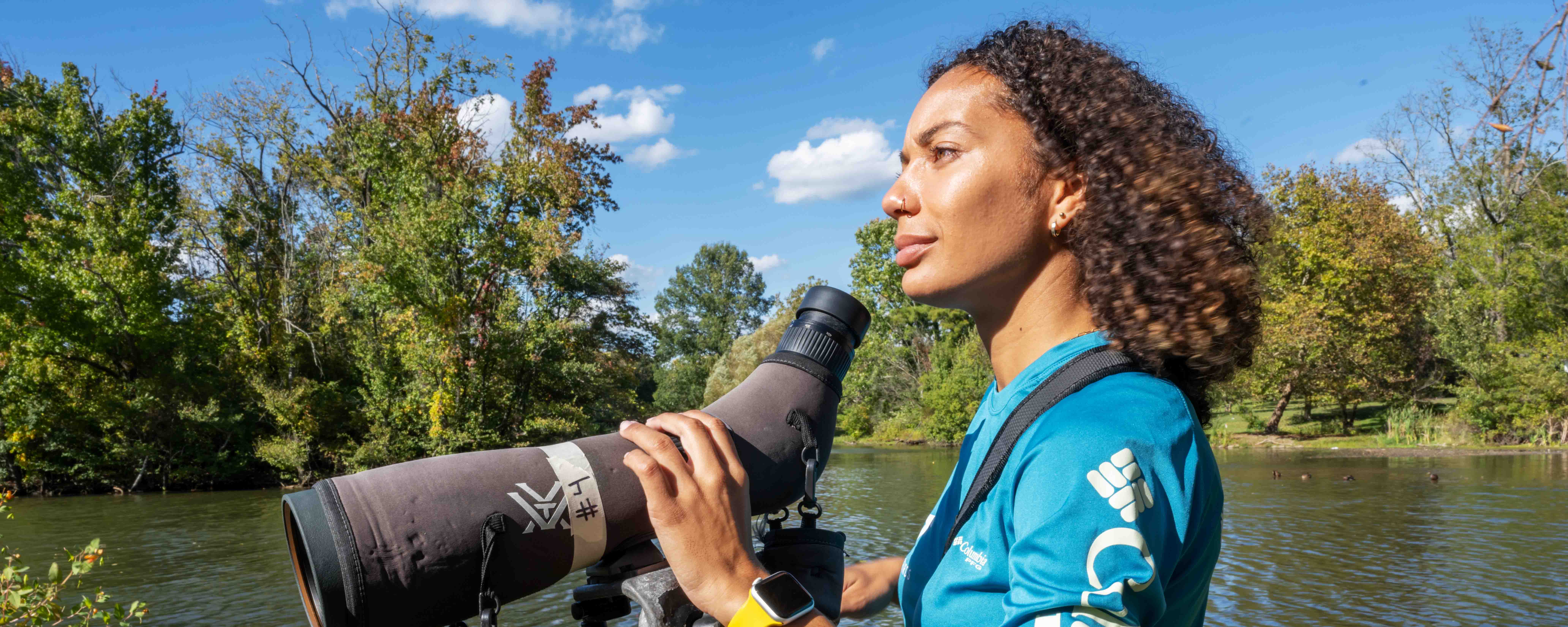Graduate student research

CNRE graduate students are blazing trails and breaking barriers
On a barrier island off the coast of Long Island, Sharon Dorsey held four piping plover chicks and used her camera phone to take a short video. The project videos provided a daily record of her field research monitoring the piping plover population on Fire Island. And as a woman of color, Dorsey has also used her video skills to create a documentary about her experiences as a researcher and racial minority in her field.
CNRE’s graduate students are doing their part to advance their fields of study, whether it’s by broadening representation, making new research discoveries, or sharing their knowledge as teachers and mentors.
Are you ready to take on the world’s most complex challenges?
That’s what we do every day in the College of Natural Resources and Environment. So if you share our passion for making a difference and for working to ensure the sustainable management of natural resources, CNRE is the place for you. Ready to apply? Learn more about graduate school admission.
Below is a just a sampling of research interests of CNRE graduate students:
- Climate change adaptation and resilience
- Remote sensing of conflict zones
- Geovisualization and geospatial programming
- Medical geography and environmental health
- Forestry best management practices for water quality
- Remote sensing analysis of southern yellow pine recovery
- Genomic tools for the American chestnut
- Ecology of black bears, bobcats, and coyotes
- Climate change effects on fish, reptiles, and amphibians
- Natural history, ecology, and behavior of bats
- Human dimensions of conservation on private lands
- Circular economy and circular business models
- Unit load sustainability and packaging sustainability
- Conversion from biomass to biofuels
A burning interest in prescribed fire research

Former graduate students Chris Dukes (at right) and George Hahn both managed fire ecology research projects at Virginia Tech while working with Assistant Professor Adam Coates. Dukes earned his master’s degree and conducted research on “Soil responses to prescribed fire and fire surrogate treatments in the southern Appalachian Mountains.” Hahn, a doctoral student, studied “Central Appalachian Mountain prescribed fire effects: Fuels, soils, tree regeneration, and water quality.”
Collaborations with faculty are key to our graduate students’ success
CNRE faculty are not only the rock stars of their research disciplines; they’re also the teachers, advisors, and mentors who work hard behind the scenes to help graduate students be successful. Choose to pursue a master’s or doctoral degree in the college, and you’ll work with faculty members from day one. They’ll assist with course selection, help guide your research, and make sure you successfully navigate all the hurdles leading to thesis or dissertation completion.
A silver lining in the fight for clean water in India

Meghan Albritton, a dual master’s degree student in geography and public health, spent eight weeks over her winter break making an impact for schools in rural India. Albritton worked with Geography Associate Professor Luke Juran on a project that involved trialing an established water disinfection treatment to see if it could also be effective at the community scale for rural schools.
Graduate fellowships open doors for learning
If you are a current or potential CNRE graduate student, you’ve probably realized the importance of finding ways to help cover the costs of college. Start your search for a fellowship by talking with the graduate studies coordinator for your department. They’ll have more details and information about the college fellowships listed below. You can also visit the Graduate School website to search for university and external fellowship opportunities.
- Burd S. McGinnes Fellowship (Department of Fish and Wildlife Conservation)
- Dwight Chamberlain Graduate Wildlife Fellowship (Department of Fish and Wildlife Conservation)
- Richard Hunter Cross, Jr. Scholarship (Department of Fish and Wildlife Conservation)
- Robert Burruss Fellowship in Forestry (Department of Forest Resources and Environmental Conservation)
- William J. Dann Fellowship (Department of Forest Resources and Environmental Conservation)
- William R. Walker Graduate Research Fellowship (Virginia Water Resources and Research Center)
Looking for research-related funding opportunities?
Developing and implementing a successful research project and then sharing the results at a conference or professional meeting are key opportunities for graduate students seeking a career in academia or a research-related position in industry. The College of Natural Resources and Environment offers grants to help fund graduate student travel and obtain satellite beacons for use in the field. You can also check out our resources for investigating and learning about external sources of funding.


